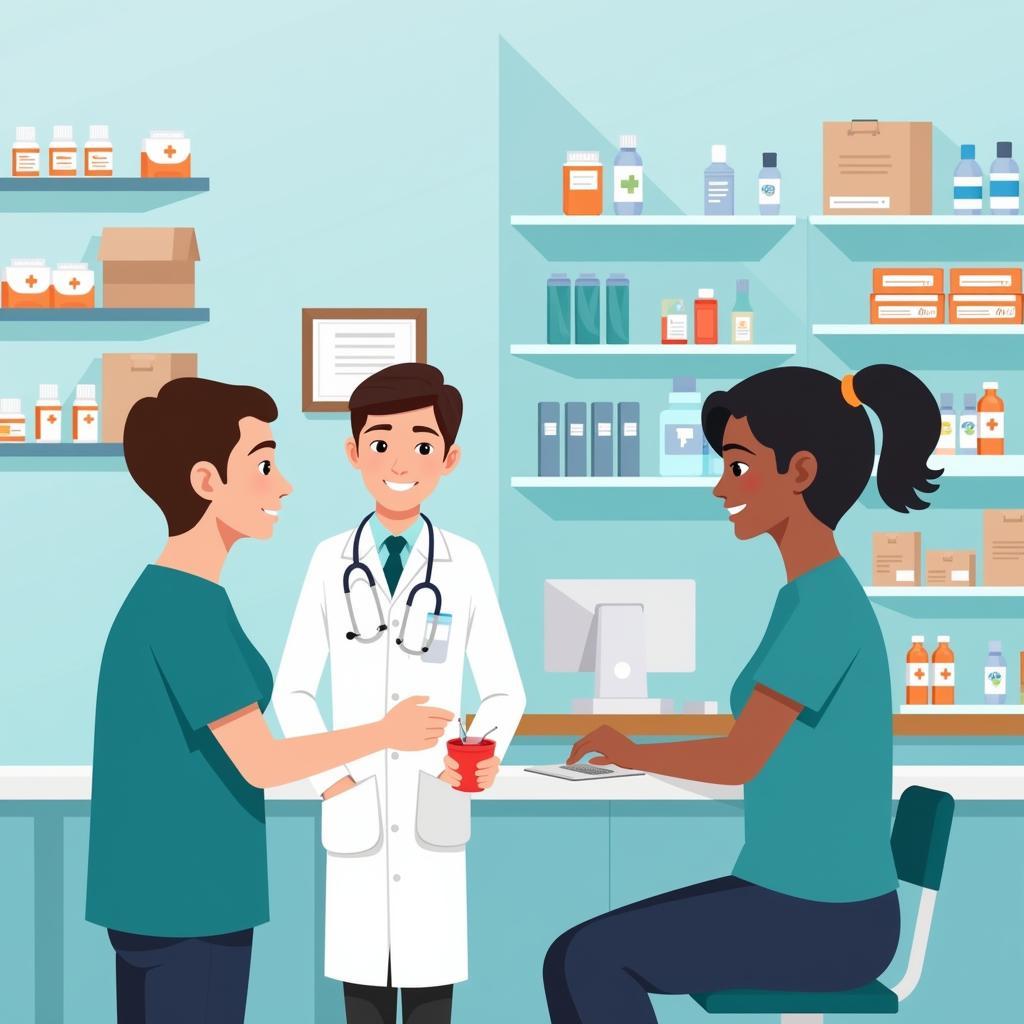Clinical Pharmacist Vs Hospital Pharmacist – are they the same? Many people use these terms interchangeably, but subtle yet significant distinctions exist between these two vital roles in healthcare. This article delves into the specifics of each career path, exploring their respective responsibilities, educational requirements, and career prospects.
 Clinical vs. Hospital Pharmacist Roles
Clinical vs. Hospital Pharmacist Roles
Defining the Hospital Pharmacist
Hospital pharmacists are primarily responsible for the safe and effective medication management within a hospital setting. Their duties involve dispensing medications, verifying prescriptions, managing drug inventories, and ensuring compliance with hospital regulations. They work closely with other healthcare professionals to optimize medication therapy and prevent medication errors. They are the backbone of pharmaceutical services within the hospital. Think of them as the guardians of the hospital’s medication supply chain.
Core Responsibilities of a Hospital Pharmacist
- Dispensing and verifying prescriptions.
- Managing medication inventories.
- Monitoring drug interactions and adverse drug reactions.
- Providing drug information to healthcare professionals and patients.
- Ensuring compliance with regulations.
- Compounding sterile and non-sterile preparations.
- Participating in medication safety initiatives.
Understanding the Clinical Pharmacist Role
Clinical pharmacists work directly with patients and physicians to optimize medication therapy and improve patient outcomes. They possess advanced clinical knowledge and skills that allow them to assess patient medications, identify potential drug-related problems, and recommend adjustments to medication regimens. They are an integral part of the healthcare team, contributing their expertise to ensure patients receive the most appropriate and effective medication therapy. If you’re looking for personalized medication management, a clinical pharmacist is your go-to expert.
What Does a Clinical Pharmacist Do?
- Assessing patient medications.
- Identifying and resolving drug-related problems.
- Recommending medication adjustments.
- Educating patients on medication management.
- Participating in patient care rounds.
- Collaborating with other healthcare professionals.
- Conducting medication reconciliation.
- Developing and implementing medication therapy management protocols.
Clinical Pharmacist vs Hospital Pharmacist: Key Differences at a Glance
While both roles require a strong foundation in pharmaceutical sciences, there are key differences in their focus and daily activities. Hospital pharmacists concentrate on the logistics of medication management within the hospital, while clinical pharmacists are more directly involved in patient care, applying their specialized knowledge to optimize individual treatment plans. Do you want to learn more about hospital jobs? Check out brandon regional hospital jobs.
Education and Training
Both require a Doctor of Pharmacy (PharmD) degree. However, clinical pharmacists often pursue additional postgraduate training, such as a residency or fellowship, to specialize in a specific therapeutic area. Thinking about a career in healthcare? You may also be interested in mammoth hospital employment.
Work Setting
Hospital pharmacists, as the name suggests, primarily work in hospitals. Clinical pharmacists can be found in a variety of settings, including hospitals, clinics, and outpatient care facilities. Curious about hospital units? Explore what is cdu in hospital.
Conclusion: Choosing the Right Path
Both clinical pharmacists and hospital pharmacists play vital roles in patient care. Understanding the nuances of each profession can help aspiring pharmacists choose the career path that best aligns with their interests and goals. Whether you prefer the behind-the-scenes management of medications or the direct patient interaction of clinical practice, both options offer rewarding careers in the healthcare field. The choice between clinical pharmacist vs hospital pharmacist ultimately depends on your individual preferences and career aspirations.
FAQ: Frequently Asked Questions
- What is the salary difference between a clinical and hospital pharmacist?
- What are the career advancement opportunities for each role?
- Which career path requires more direct patient interaction?
- What type of personality thrives in each role?
- How important is continuing education in these fields?
- Can a hospital pharmacist transition to a clinical pharmacist role?
- What are the common challenges faced by each profession?
If you need further assistance, please contact us at Phone Number: 02437655121, Email: [email protected] or visit our address: 298 Cau Dien Street, Minh Khai Ward, Bac Tu Liem District, Hanoi, Vietnam. We have a 24/7 customer service team.